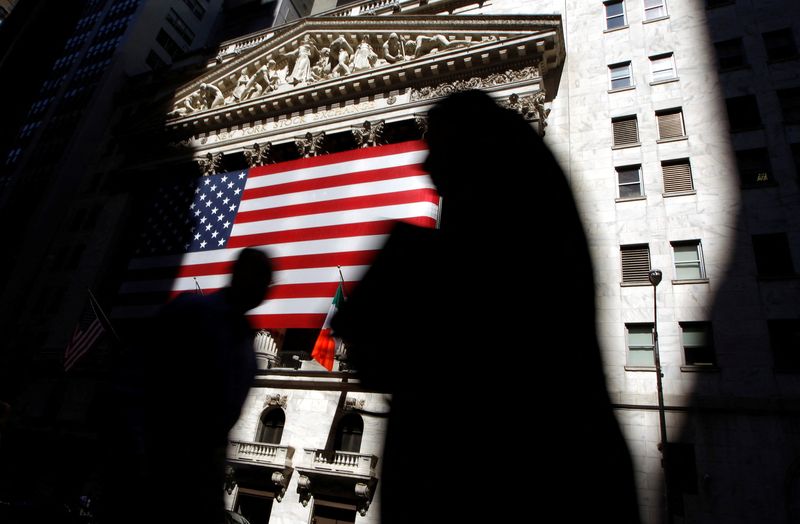By Noreen Burke
Investing.com -- In the week ahead, investors will be focusing on a speech by Federal Reserve head Jerome Powell at the central bank’s annual conference in Jackson Hole for insights on the future path of interest rates. The speech could shake up markets, with the rally in U.S. equities already showing signs of slowing. U.S. economic data will be in the spotlight as fears over the prospect of a recession linger. Meanwhile, PMI data out of the Eurozone and the UK is expected to point to further slowdowns in business activity. Here’s what you need to know to start your week.
- Jackson Hole
Investors will be eagerly awaiting Jay Powell’s speech in Jackson Hole, Wyoming on Friday for possible answers about how high U.S. interest rates may go and how long they will need to stay at elevated levels to bring inflation back under control.
The Fed has hiked interest rates by 225 basis points since March in a bid to battle inflation which is running at the highest in four decades.
Fed policymakers have reiterated that there is still a way to go in their inflation fight, pushing back on expectations of a peak in inflation and a so-called dovish pivot, one narrative that has helped boost stocks.
Last week’s Fed minutes showed that while the size of the September rate hike is still in play policymakers felt there was little evidence so far that inflation pressures are subsiding.
Powell is likely to remind investors that with one more inflation report and another employment report still to come before the September meeting officials still have time to decide how large that rate hike should be.
- U.S. data
The economic calendar for the coming week features July figures on personal income and spending, which includes the personal consumption expenditures price index, the Fed’s preferred measure of inflation.
In the 12 months through June, the PCE price index advanced 6.8%, the largest increase since January 1982.
Other data points include figures on revised second-quarter gross domestic product, which initially showed a contraction of 0.9%.
There will also be reports on durable goods orders, initial jobless claims, and PMI data for July. Meanwhile, data on new home sales will shed more light on the cooling housing market.
- Stocks
U.S. stocks have rallied since the start of the second half boosted by stronger-than-expected corporate earnings and hopes the economy can avoid a recession even as the Fed hikes rates to curb inflation.
Markets have gained despite warnings from Fed policymakers that expectations of a peak in inflation and a so-called dovish pivot from the central bank may be premature.
But there are signs the rally may be starting to slow after Wall Street’s three major indexes all ended last week lower. The S&P 500 fell about 1.2% and the Nasdaq slid 2.6%, both snapping a four-week streak of gains. The Dow lost about 0.2% for the week.
"When market participants start to return from their holidays and look back ... they will find central banks still far from having achieved their goals of reining in inflation," ING rates strategists said in a note to clients.
"That means a continued tussle between central bank tightening expectations and recession fears."
- Eurozone PMIs
The Eurozone is to release PMI data for August on Tuesday that will be closely watched after July’s composite PMI dipped below 50, pointing to a contraction in business activity. PMI readings are expected to deteriorate again with energy prices in the euro area still rising.
The bloc is to release data on consumer confidence for August later Tuesday, which is expected to hit a fresh record low after dropping to an all-time low in July.
Market watchers will also be looking at Thursday’s minutes of the European Central Bank’s July meeting for any insight on how large of a rate hike to expect in September after officials raised rates by 0.5% last month and flagged another increase at their upcoming meeting without committing on the size.
- UK PMIs
The UK is to publish PMI data on Tuesday which will be closely watched after the Bank of England warned earlier this month of a 15-month recession starting from the end of this year.
Inflation in the UK hit 10.1% in July, the highest since February 1982, and some economists expect it will hit 15% in the first quarter of next year amid surging energy and food costs.
Data last week showed that wages are lagging far behind price growth and consumer confidence has fallen to a record low.
The BoE has already hiked interest rates six times since December, acting as a drag on growth, but signs of broadening inflation pressures have prompted economists to raise their forecasts for further rate increases.
--Reuters contributed to this report
